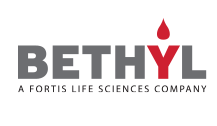Rabbit anti-Ki-67 IHC Antibody Affinity Purified

Product Details
Specifications
The epitope recognized by IHC-00395 maps to a region between residues 1800 and 1850 of human Ki-67 using the numbering given in entry NP_002408.2 (GeneID 4288). Antibody was affinity purified using an epitope specific to Ki-67 immobilized on solid support.
The epitope recognized by IHC-00395-T maps to a region between residues 1800 and 1850 of human Ki-67 using the numbering given in entry NP_002408.2 (GeneID 4288).
Additional Product Information
Ki-67 is a marker of cell proliferation detected in cells that are in G1-, S-, G2-, and M-phase of the cell cycle and absent in cells in G0. Ki-67 is detected exclusively in the nucleus, and its detection by immunohistological methods has proven to have diagnostic and prognostic value in the study of a variety of human tumors. The specific cellular functions of Ki-67 have not been elucidated, but it is proposed to function in the organization and maintenance of the architecture of DNA and in the synthesis of ribosomes during mitosis.
Alternate Names
antigen identified by monoclonal antibody Ki-67; antigen Ki67; Antigen KI-67; KIA; MIB-; MIB-1; PPP1R105; proliferation marker protein Ki-67; proliferation-related Ki-67 antigen; protein phosphatase 1, regulatory subunit 105
Applications
Epitope exposure is recommended.
Epitope exposure with tris-EDTA pH9.0 buffer will enhance staining.
Likely to work with frozen sections.
In some cases, the antibody may be diluted further than indicated.
